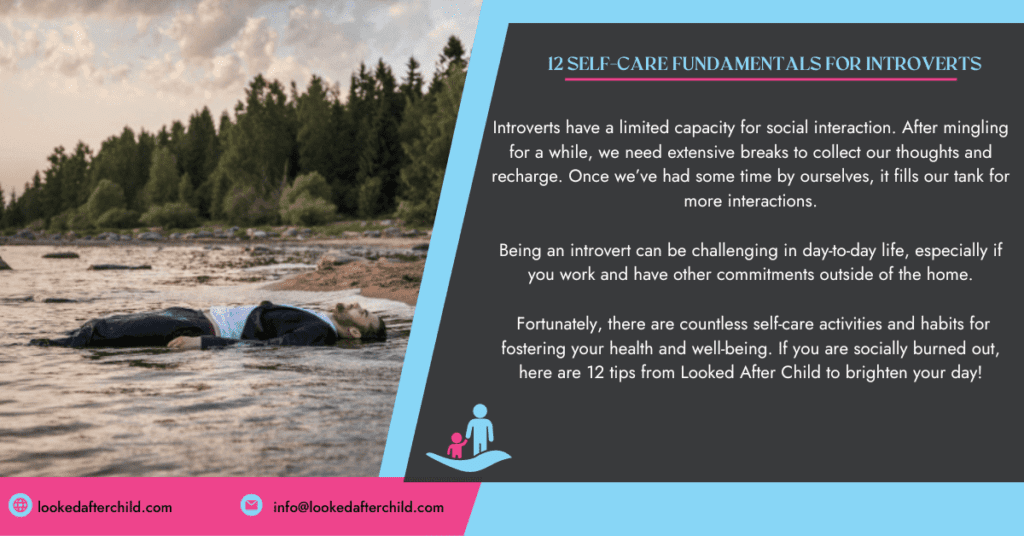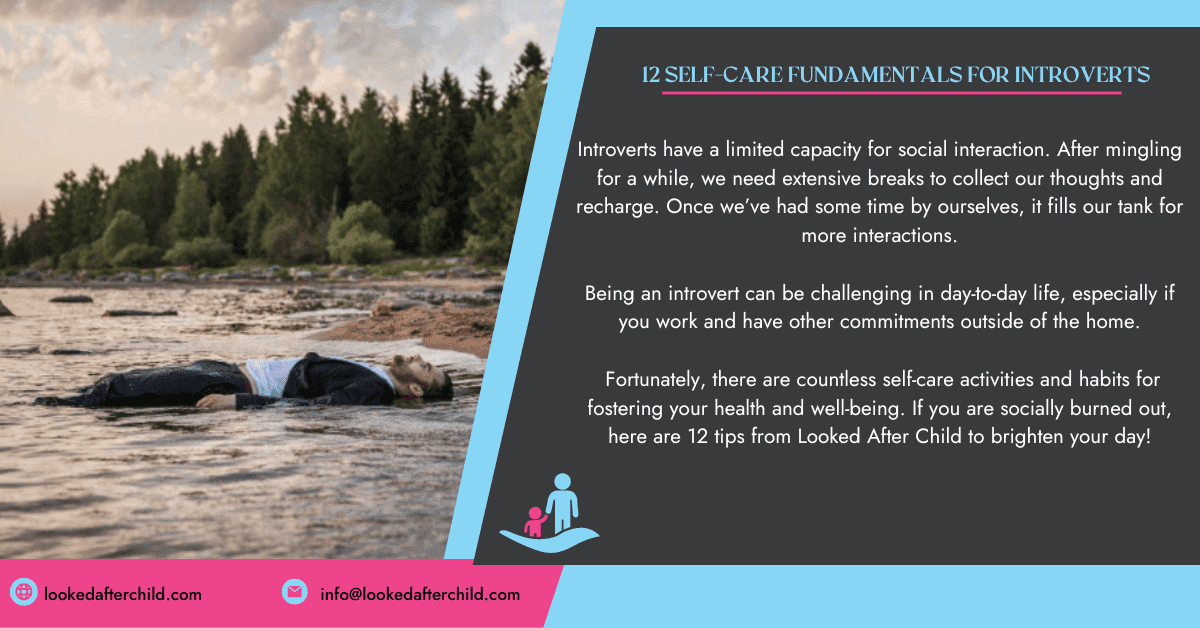
Introverts have a limited capacity for social interaction. After mingling for a while, we need extensive breaks to collect our thoughts and recharge. Once we’ve had some time by ourselves, it fills our tank for more interactions.
Being an introvert can be challenging in day-to-day life, especially if you work and have other commitments outside of the home. Fortunately, there are countless self-care activities and habits for fostering your health and well-being. If you are socially burned out, here are 12 tips from Looked After Child to brighten your day!
Table Of Contents
1. Remove Clutter
It’s difficult to have peace and rest in the home when it’s filled with junk and unorganized. You can easily eliminate the negative energy in your environment by taking time to thoroughly declutter. Spend the weekend going through your closets, office, kitchen, and other areas to remove anything you no longer need or want. It will open up more space and make it easier to keep an organized and clean home.
2. Pick Up Meditation
If your mind needs rest, meditation will do the trick. Introverts tend to have highly sensitive brains that instantly react to the most minor stimulations. Translation: you lose energy and become exhausted more easily than your extrovert friends and family members. Get a mindfulness meditation app that will help you slow down, focus on the present, and recharge.
3. Breathe Deeply
If you often struggle to quiet your mind, try various breathing exercises and you’ll be amazed by the impact. There is power in taking full and slow breaths, and any time you get stressed out, spend a few minutes focusing only on your breathing patterns. The stress will gradually slip away.
4. Wake Up with the Sun
There is a special solitude that comes in the morning while everyone else is still asleep. Waking up to a sunrise can do wonders for your mental health and help you start the day off in a peaceful state of mind. If you are like most introverts, the hustle-and-bustle of daily life regularly burns you out. But rising with the sun will help keep the stress at bay.
5. Plant a Garden
Spending time in nature is good for the body, soul, and mind. If you live in an area with beautiful natural sights, go for regular walks, have picnics, or do any other relaxing activities with the greenery and peaceful sounds surrounding you.
Another option is to start a garden at home. Many people are surprised by how much they enjoy growing their own vegetables and herbs. Besides the physical and mental health benefits, it allows you to be in more control of your nutrition and food budget.
6. Take a Walk
Physical activity is critical for introverts because it can quickly reduce stress and help to recharge. If you’re not keen on exercise, try walking every day for 20 minutes. You could even use your walks as an opportunity for meditation and reflection. Consult a Walk Score map to find the best places nearby to walk.
7. Break Into Dance
You know you like to dance alone—or you at least think about it now and then. There’s something about freely dancing that can bust the stress and boost the mood. Make a list of some of your favorite pop songs, and find choreography videos online that you can practice too. If you prefer salsa, jazz, or any other genre, you can probably find free or low-cost instructional videos for those as well.
8. Up the Intensity
If you are after a bit more intensity in your exercise routine, you have plenty of options. You can keep it simple by going for runs through your neighborhood. Or, you could invest in some weight lifting equipment and find movements in workouts that help you to reduce stress while strengthening your bones and muscles.
Another option is HIIT, which combines cardio, strength, balance, and other factors into single workouts. Many people like HIIT because it regularly mixes up routines and keeps things interesting.
9. Keep a Journal
If you’ve never tried journaling, now is your time. Keeping a journal can provide you with an excellent outlet for reflection and expressing your deepest thoughts and emotions. If you write in it every day, you can look back and track your mood and energy over time. Or, you can simply write about daily life and do it for fun.
10. Interview Yourself
Self-care sometimes gets a bit uncomfortable. For example, talking about relationship issues with someone you are close to or getting your finances in order may not be the most fun, but they can make you feel better long-term.
Another unique and potentially uncomfortable activity to consider is giving yourself an interview. Make a list of questions that will intentionally reveal problems, solutions, and interesting facts about yourself. For example, how could you change your life to become happier? Is there something you’ve always wanted to do or somewhere you have always wanted to go? What is a dream you never realized, and what’s keeping you from pursuing it?
Don’t be surprised if this awkward exercise becomes second nature. You may even grow to love it!
11. Pet an Animal
If you have a four-legged companion, give it a little extra affection and see if it doesn’t improve your mood. Pets are wonderful companions, but spending time with them still counts as solitude. By the way, you can still benefit from petting an adorable furball if you don’t own one. You could volunteer at a local animal shelter or see if any neighbors need any dog walking services.
If you’ve been feeling stress and anxiety from your job, be mindful of how that can affect your pet. If you notice sudden changes in their behavior, consider what changes you can make. Try to spend more time with them at home or arrange for a pet sitter.
12. Read for Pleasure
Most of us read to some extent in our daily lives. But how often do you read for sheer enjoyment? As an introvert, chances are you have a list of must-reads growing by the day. Now is the time to start tackling that list by carving out 30 minutes a day for reading. Whether you are into novels, biographies, or any other genre, treating yourself to a book every day can do wonders for your mind and soul.
Stop waiting for your recharge to happen, and make time for stress-reducing activities that fit into your daily life. The ideas above are a great place to start, but there are countless other activities worth considering. Most importantly, remember that as you embrace being introverted and foster your health and well-being, you will lead a higher quality of life and be more prepared for social interactions.
Authored By Guest Poster -> Jennifer Scott


0 Comments